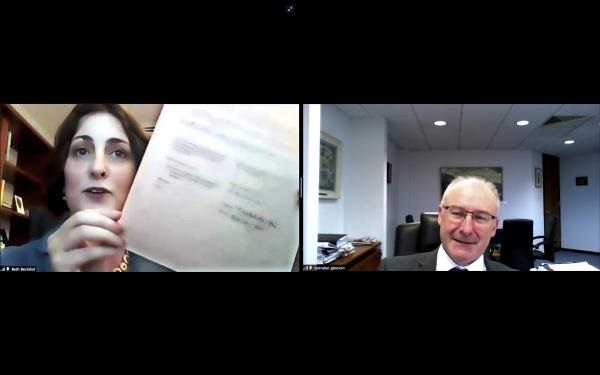
11 February 2021, Rome - The Food and Agriculture Organization of the United Nations (FAO) and the Republic of Ireland signed a new Framework Agreement today, consolidating a longstanding collaboration between the two parties in the area of development cooperation.
The new agreement will cover a period from 2021 to 2024 and is designed to contribute to the parties' common humanitarian and development priorities. Within the scope of the agreement, Ireland will provide expertise and financial contributions to governments of developing and transition countries to support the development of sustainable food systems. Activities developed under the agreement will also focus on improving gender equality, mitigating the impacts of climate change, building resilience and strengthening governance around food security and nutrition.
Ireland has been a Member of FAO since 1946, and concentrates its support on long-term development assistance in nine key partner countries (Ethiopia, Lesotho, Malawi, Mozambique, Sierra Leone, United Republic of Tanzania, Uganda, Viet Nam and Zambia) as well as assisting a small number of other countries, which are affected by conflict. The country is also a strong supporter of humanitarian and resilience efforts, providing critical contributions to FAO's Desert Locust response and ensuring that vulnerable people maintained access to nutritious diets during the COVID-19 pandemic.
Speaking at the virtual signing ceremony, Brendan Gleeson, Secretary General of the Department of Agriculture, Food and the Marine, welcomed the agreement as a way for FAO and Ireland to strengthen their shared commitments to build back better from the devastating effects of the pandemic. "Today's virtual signing is an important opportunity for Ireland to demonstrate its continued commitment to the partnership with FAO in the global fight against hunger and malnutrition," he said. "We look forward to working together to deliver a world free from hunger by 2030."
Signing on behalf of FAO, Deputy Director-General Beth Bechdol praised Ireland's deep commitment to advancing sustainable food systems, emphasizing that the country's expertise in the areas of agritech, digital innovation, and sustainable, climate-sensitive agriculture production would be key to solving some of the most complex challenges that lay ahead. "This pandemic has provided clear evidence that innovation and in particular, digital innovation is crucial and is certain to become a structural feature of all industries - especially food and agriculture - in the near term," she said. "With all of these challenges and with all of this change, now is absolutely the time for strengthened cooperation and partnership."
A leader in sustainable food systems
Ireland stands out as an example of the transformative power of agricultural development: a country once known for its great famine is now recognized as a leader in sustainable, climate-sensitive agriculture and food production.
The country has developed robust and integrated systems to govern its agriculture and food, and shares its expertise through Sustainable Food Systems Ireland (SFSI), a partnership of Irish government agencies led by the Ministry of Agriculture, Food and the Marine. SFSI provides technical assistance to governments and organizations in all aspects of agri-food systems' development and regulation, drawing on the country's experience, technologies and practices in the areas of food safety and traceability, sustainability, animal health and welfare, and innovation.
Ireland's commitment is further reflected in three Funding Agreements signed with FAO at the end of 2020, which focus on climate change, COVID-19 response and recovery and their support to the Food Systems Summit, which will be held later this year.